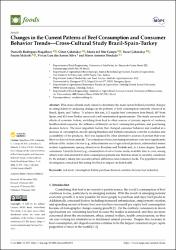| dc.contributor.author | Magalhaes, Danielle Rodrigues | |
| dc.contributor.author | Çakmakçı, Cihan | |
| dc.contributor.author | Campo, Maria del Mar | |
| dc.contributor.author | Çakmakçı, Yusuf | |
| dc.contributor.author | Makishi, Fausto | |
| dc.contributor.author | Silva, Vivian Lara dos Santos | |
| dc.contributor.author | Trindade, Marco Antonio | |
| dc.date.accessioned | 2023-05-06T17:23:40Z | |
| dc.date.available | 2023-05-06T17:23:40Z | |
| dc.date.issued | 2023 | |
| dc.identifier.issn | 2304-8158 | |
| dc.identifier.uri | https://doi.org/10.3390/foods12030475 | |
| dc.identifier.uri | https://hdl.handle.net/20.500.11776/12234 | |
| dc.description.abstract | This cross-cultural study aimed to determine the main factors behind potential changes in eating habits by analyzing changes in the patterns of beef consumption currently observed in Brazil, Spain, and Turkey. To achieve this aim, 412 regular beef consumers from Brazil, 407 from Spain, and 424 from Turkey answered a self-administered questionnaire. The study surveyed the effects of economic factors, switching from beef to other sources of protein, aspects of credence, health-related concerns, the influence of lifestyle on beef consumption patterns, and purchasing decision factors. The most important factors that changed consumer behavior and resulted in a decrease in consumption, mostly among Brazilian and Turkish consumers, were the economics and accessibility of the products. Beef was replaced by other alternative sources of protein that were likewise derived from animals. The consumers whose purchasing intentions were most significantly influenced by credence factors (e.g., indiscriminate use of agricultural products, substandard animal welfare requirements, among others) were Brazilian and Turkish and, to a lesser degree, Spanish consumers. Lifestyle factors (e.g., consumption of out-of-home meals, available time to cook, among others) were demonstrated to alter consumption patterns and therefore must be carefully considered by the industry, taking into account cultural differences and consumer needs. The population under investigation considered that eating beef had no impact on their health. | en_US |
| dc.description.sponsorship | National Council for Scientific and Technological Development (CNPq-Brazil) [150556/2020-9] | en_US |
| dc.description.sponsorship | D.R.M. was supported by the National Council for Scientific and Technological Development (CNPq-Brazil) through a postdoctoral (PDJ) scholarship (150556/2020-9). | en_US |
| dc.language.iso | eng | en_US |
| dc.publisher | Mdpi | en_US |
| dc.identifier.doi | 10.3390/foods12030475 | |
| dc.rights | info:eu-repo/semantics/openAccess | en_US |
| dc.subject | red meat | en_US |
| dc.subject | consumption habits | en_US |
| dc.subject | purchase decision | en_US |
| dc.subject | extrinsic factors | en_US |
| dc.subject | beef reduction | en_US |
| dc.subject | Meat Consumption | en_US |
| dc.subject | Life-Styles | en_US |
| dc.subject | Quality | en_US |
| dc.subject | Preferences | en_US |
| dc.subject | Avoidance | en_US |
| dc.subject | Attitudes | en_US |
| dc.subject | Health | en_US |
| dc.title | Changes in the Current Patterns of Beef Consumption and Consumer Behavior Trends-Cross-Cultural Study Brazil-Spain-Turkey | en_US |
| dc.type | article | en_US |
| dc.relation.ispartof | Foods | en_US |
| dc.department | Fakülteler, Ziraat Fakültesi, Tarım Ekonomisi Bölümü | en_US |
| dc.authorid | Trindade, Marco Antonio/0000-0002-3245-5128 | |
| dc.authorid | , Yusuf Cakmakci/0000-0002-5136-9102 | |
| dc.authorid | CAKMAKCI, CIHAN/0000-0001-6512-9268 | |
| dc.identifier.volume | 12 | en_US |
| dc.identifier.issue | 3 | en_US |
| dc.institutionauthor | Çakmakçı, Yusuf | |
| dc.relation.publicationcategory | Makale - Uluslararası Hakemli Dergi - Kurum Öğretim Elemanı | en_US |
| dc.authorwosid | Trindade, Marco Antonio/C-9135-2012 | |
| dc.identifier.wos | WOS:000932904600001 | en_US |
| dc.identifier.pmid | 36766003 | en_US |



















